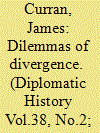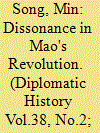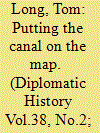| Srl | Item |
| 1 |
ID:
132022


|
|
|
|
|
| Publication |
2014.
|
| Summary/Abstract |
In the period from December 1972 until November 1975 the US-Australia alliance faced its greatest ever crisis. In the hands of President Richard Nixon and Australian Prime Minister Gough Whitlam, a relationship that had endured the heights of the Cold War veered dangerously off course and seemed headed for destruction. For Whitlam the world emerging from the ashes of Vietnam offered an exciting opportunity to recast Australia's image in the eyes of the world and redefine the alliance. For Nixon, the ongoing difficulties in securing an end to the war and the mounting pressures of the Watergate scandal produced a visceral reaction to any criticism-but especially that from once close and trusted allies. In his rage he threatened to rip apart the very fabric of the alliance, asking that options be explored for pulling out top secret U.S. intelligence installations in Australia and ending all intelligence sharing. In Australia, although some saw Whitlam as the great modernizer of Australian foreign relations, others feared he was recklessly endangering the protective umbrella provided by the United States.
|
|
|
|
|
|
|
|
|
|
|
|
|
|
|
|
| 2 |
ID:
132023


|
|
|
|
|
| Publication |
2014.
|
| Summary/Abstract |
Following President Richard Nixon's visit to China in February 1972, U.S.-China trade increased almost ten-fold within three years, of which China's agricultural imports represented the largest category. This trade created unprecedented opportunities for the Chinese pragmatists to pursue economic modernization, and sharpened the conflict between them and the radicals who adhered to Mao Zedong's ideological crusade. Drawing on both English and Chinese sources, this article examines the fluctuations of China-U.S. agricultural trade between 1972 and 1978. It focuses on the process of trade management in an ideologically charged environment, specifically, the interactions between the pragmatists and radicals under the dominance of Mao. It argues that this trade brought tremendous pressure on the very framework of that Chinese system, tested the boundaries of Mao's revolutionary ideology, and encouraged a fundamental change of course in China.
|
|
|
|
|
|
|
|
|
|
|
|
|
|
|
|
| 3 |
ID:
132024


|
|
|
|
|
| Publication |
2014.
|
| Summary/Abstract |
In the early 1970s, Panama's negotiations with the United States over the status of the Panama Canal ground to a standstill. General Omar Torrijos had rejected treaties left unratified by previous governments only to receive a less generous offer from the Nixon administration. Realizing that the talks were being ignored in Washington, the Panamanian government worked to internationalize the previously bilateral issue, creating and exploiting a high-profile forum: Extraordinary meetings of the UN Security Council in March 1973 held in Panama City. In those meetings, Panama isolated the United States in order to raise the issue's profile and amplify the costs of leaving the matter unsettled. Using underutilized Panamanian sources, this article examines that meeting, the succeeding progress, and the effect of this early stage on the final negotiations several years later. The case also illustrates how, during the unsettled international environment of the 1970s, a small state utilized international organizations to obtain attention and support for its most important cause.
|
|
|
|
|
|
|
|
|
|
|
|
|
|
|
|